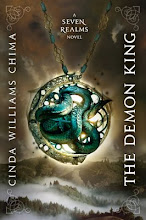
Q: Ms. Chima. Have you ever gone back and read your own books and began to wish that you had written certain parts differently or do you think that you captured the entire story just as you had imagined it?
Thanks, Matt
Thanks, Matt
A: Matt, actually, I can’t stand reading my books once they’re in print, because I always want to change things. I can always see room for improvement, ways I can sharpen dialogue or deliver emotion more effectively. When I write sequels, it always gives me ideas about things I could have done differently in previous books. (If I’d known in Book 1 that Han needed to know all about poisons….) But short of traveling to bookstores and putting sticky notes in, I’m pretty much stuck with the way they are.
There are many potholes along the road to publication. One of them is sending work out before it’s ready. I’ve written before about the importance of revision, because a first draft is never as good as it can be.
But sometimes revision is just an excuse to hold onto a project. If you send your manuscript out, somebody might reject it. It’s much safer just to keep messing with it.
If you want to be a writer, you have to learn when to revise—and when to stop. First, you educate yourself by reading great fiction, reading books on craft, and attending conferences. That will prep you to do your best work. Then write the best book you can and have it critiqued by peers and mentors. Then revise revise revise until it is as good as you can make it at that point in time. Then let it go.
There are many potholes along the road to publication. One of them is sending work out before it’s ready. I’ve written before about the importance of revision, because a first draft is never as good as it can be.
But sometimes revision is just an excuse to hold onto a project. If you send your manuscript out, somebody might reject it. It’s much safer just to keep messing with it.
If you want to be a writer, you have to learn when to revise—and when to stop. First, you educate yourself by reading great fiction, reading books on craft, and attending conferences. That will prep you to do your best work. Then write the best book you can and have it critiqued by peers and mentors. Then revise revise revise until it is as good as you can make it at that point in time. Then let it go.













